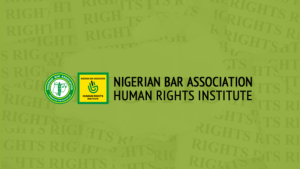Representatives of civil society organizations, humanitarian partners, displaced persons, and all stakeholders present, Ladies and Gentlemen:
I rise today with a profound sense of urgency and moral duty as the 1st Vice President of the Nigerian Bar Association and Chairman of the Human Rights Institute. This is not just a speech, but a clarion call to conscience. We speak not only for legal principles, nor for policy debates, but for the voiceless, the internally displaced women, children, and men who today languish in camps across our nation, living in conditions that represent flagrant violations of basic human rights.
1. Setting the Stage: Human Rights, the Rule of Law, and IDPs
The Nigeria’s 1999 Constitution affirms the dignity of the human person and guarantees the right to life, personal liberty, and security of the person. Nigeria is a party to the African Charter on Human and Peoples’ Rights, the Kampala Convention on internal displacement, and the United Nations Guiding Principles on Internal Displacement.
These instruments impose on the State a legal and moral obligation to protect displaced persons from harm, ensure the provision of basic services, and facilitate their safe return or resettlement.
Yet, despite these commitments, we stand today in a moment of stark contradiction.
More than 3.6 million Nigerians are internally displaced.
In North-Central and North-West Nigeria alone, over 1.3 million IDPs currently live in camps or camp-like settings, often under dire circumstance.
Recent surveys show alarming indicators: in Yobe State, 92% of IDP households reported “poor or very poor living conditions” in camps.
These statistics are not abstract, they reflect ongoing systemic violations of human rights, dignity, and justice.
2. Human Stories: Lives at the Mercy of Neglect
To understand the human rights crisis unfolding in IDP camps, we must look beyond numbers. There are several camps in Borno and Benue States, where I have personally visited as the Chairman of NBA-HRI where mothers had lost children to preventable illnesses, and youth with wasted years without schooling. Some have shelters that flood with rain, others had births in camp toilets without medical attention.
In Benue State, Amnesty International has documented that over 500,000 displaced people are living in squalid camps or makeshift sites, facing shortages of food, water, shelter, and medical care.
A particular woman in Makurdi IDP camp, after fleeing her village following violent attacks, told investigators: “We lost everything, our homes, our farmland, and now our hope. We don’t sleep at night because of fear. At least feed us and give us dignity while we wait.”
These testimonies reveal not only displacement but a prolonged human rights violation, of the right to health, the right to shelter, the right to education, and the right to live in dignity.
3. Identifying the Violations: Where the System Fails
From a human rights lens, the conditions in many IDP camps across Nigeria reflect multiple and overlapping violations:
1. Right to Health and Life: Overcrowded camps, inadequate sanitation, lack of potable water, and limited access to essential medical services have contributed to outbreaks of cholera, malaria, malnutrition, and maternal and neonatal complications. These Reports Reports from Borno, Yobe, and Benue indicate that many IDPs die from preventable illnesses, deaths the government could and should have prevented.
2. Right to Adequate Housing: Shelter in IDP camps is often temporary, makeshift, and vulnerable. During flood seasons or heavy rains, tents and basic shelters fail, exposing families to the elements, diseases, and further displacement. Many IDP camps themselves become flood-prone sites.
3. Right to Education: Thousands of children in displacement have had their education disrupted or ended altogether. Many camps lack functional schools; in places where makeshift schools existed, funding is inconsistent and teachers unpaid. This interruption of education threatens the future of a generation. Amnesty International noted that camp schools in Makurdi had been closed for over three years because of lack of funding.
4. Protection from Violence and Exploitation: Women and girls in IDP camps are at heightened risk of sexual and gender-based violence, abuse, exploitation, and early marriage. In many cases, survivors lack access to justice or adequate post-violence support. IDPs have also described ongoing threats from armed groups who attack camps or nearby host communities. In Benue, gunmen attacks have compounded the vulnerabilities of displaced populations
5. Right to Identity and Civic Participation: Many displaced persons lose personal documentation, birth certificates, land titles, identity papers, during conflict or displacement. Without such documentation, they are excluded from access to social services, voting rights, financial inclusion, and legal redress. This loss of identity is both a symbolic and practical violation of citizenship and dignity.
6. Right to Livelihoods and Food Security: Displacement often severs access to farmland, markets, and income sources. Many IDPs cannot engage in meaningful livelihoods and rely on sporadic humanitarian aid. Food insecurity is widespread: nutrition surveys show rising rates of malnutrition, especially among children and pregnant women, which is a direct threat to life and human dignity.
These violations are not incidental. They reflect systemic neglect, ineffective camp management, weak infrastructure, and gaps in policy implementation. They signal not only a humanitarian crisis but a profound breach of state responsibility.
4. The Cost of Inaction: Why Delay Is Dangerous
It is important to note that failing to address the plight of IDPs is not only a moral failure, it is a strategic threat to national stability, development, and unity.
Lost Generation: Children who miss years of schooling are less likely to ever return, less likely to find gainful employment, and more likely to become disengaged citizens. They risk becoming prey to radicalization, criminal recruitment, or permanent destitution.
Deepening Human Rights Trauma: Prolonged displacement without meaningful intervention compounds trauma. Mental health challenges, social breakdown, and psychosocial distress become entrenched, placing long-term burdens on host communities and healthcare systems.
Social Friction and Conflict: Prolonged camp situations and forced or unmanaged returns can spark frictions between IDPs and host communities over scarce resources, land, water, food, security. Without careful planning, the return of displaced persons can reignite violence, resentment, and communal conflict.
Erosion of Trust in Governance: Citizens who perceive themselves abandoned by the state lose faith in public institutions. This erosion of trust reduces government legitimacy, weakens civic engagement, and fuels cycles of conflict and displacement.
Economic and Developmental Costs: in Displacement disrupts local economies. Agricultural production falls, markets suffer, and recovery becomes more expensive over time. The cost of managing prolonged displacement far exceeds the cost of early, dignified, and rights-based responses.
It’s important to note that, inaction is not a neutral position. It is a decision, a decision that sanctions suffering, disrupts lives, and undermines the nation’s future.
5. An Urgent Call for Presidential Leadership and Action
The point at which this discussion meets decision is here and now. The Nigerian Bar Association Human Rights Institute calls upon your leadership to take immediate, decisive, and lasting action to redress the human rights crisis in IDP camps. Specifically, we urge you to:
1. This issue is an emergency, it is eminent to Issue a Presidential Emergency Directive on IDP Human Rights Protection. This directive should activate a cross-ministry task force empowered to mobilize resources, monitor human rights standards in camps, and coordinate with state governments, humanitarian partners, and civil society.
2. Establish a National IDP Rights Protection Fund. This fund, overseen by an independent monitoring committee, would provide emergency funding for shelter, water, sanitation, healthcare, nutrition, education, and camp infrastructure improvements, ensuring that IDPs have access to dignified living conditions.
3. Mandate Regular Human Rights Monitoring and Reporting. Through the National Commission for Refugees, Migrants, and Internally Displaced Persons (NCFRMI), in collaboration with the NBA-HRI and international partners, there must be scheduled human rights audits of all IDP camps, with transparent reporting and accountability mechanisms for violations.
4. Promote Legal Identity Restoration. Launch a nationwide campaign to provide displaced persons with birth certificates, national identity cards, and other essential documentation. This would restore IDPs’ civic rights, access to services, and ability to participate in elections and economic activities.
5. Guarantee Education in Displacement. Direct the Universal Basic Education Commission (UBEC) and state education authorities to deploy mobile schools, support teachers in IDP camps, and provide materials so that displaced children have continuous access to quality education without interruption.
6. Ensure Access to Adequate Healthcare, Nutrition, and Psychosocial Services. Establish camp-based clinics staffed with qualified personnel, maternal and child health services, immunization campaigns, mental health support, and nutrition screening programs to address both physical and psychological needs.
7. Strengthen Protection Against
Gender-Based Violence. Provide safe spaces for women and girls, legal aid services, and survivor-centered care. Ensure that perpetrators of violence are held accountable, that survivors receive medical and legal support, and that prevention strategies are integrated into camp planning.
8. Design Rights-Based Resettlement and Reintegration Programs. Any plans to close or relocate camps should involve meaningful consultation with displaced communities, uphold the principle of voluntary return, ensure safe and dignified resettlement, and provide support for livelihoods and property restoration. Forced or unconsulted camp closures, as observed in parts of Borno State, have violated the rights of displaced persons and destabilized communities.
9. Facilitate Economic Livelihoods and Self-Reliance for IDPs. Support IDP households with vocational training, cash assistance, agricultural inputs, and micro-enterprise grants to enable them to rebuild their lives rather than depend wholly on aid.
6. NBA-HRI’s Role and Offer of Partnership.
The Nigerian Bar Association Human Rights Institute does not present this discourse as a distant observer. We stand ready to partner fully in implementing these recommendations.
Monitoring and Documentation: We will deploy trained human rights monitors to document violations, provide legal assistance for victims, and produce regular reports on camp conditions.
Legal Aid and Advocacy: We will support displaced persons in reclaiming their rights, whether to housing, identity, compensation, or justice, through legal representation, public interest litigation, and strategic advocacy.
Capacity Building: We offer to train camp administrators, state officials, and humanitarian actors on international standards of displacement protection, human rights law, and gender-sensitive practices.
Community Outreach and Education: NBA-HRI will facilitate awareness campaigns on rights, civic participation, peaceful reintegration, and the legal obligations of the state, empowering displaced communities to engage with the process actively and confidently.
7. Conclusion: A Pivotal Moment for Nigeria’s Humanity and Legacy
Nigeria is a nation founded on the promise of dignity, liberty, and the protection of the vulnerable. How we respond to the crisis of displaced citizens is not just a measure of our policy effectiveness, it is a reflection of our national character, our collective values, and our commitment to constitutional and international obligations.
We are at a crossroads. We can allow this crisis to linger, watch displacement become perpetual, and allow generations to grow up without homes, education, or hope. Or we can declare an emergency, that is decisive and compassionate, that no Nigerian is expendable. That the suffering of displaced persons is not a footnote in our national story, but a call to action, to justice, and to restoration.
Let this administration be remembered not for the crisis it inherited, but for the humanity it revived, for the displaced mothers who could feed their children, for the young girl who could return to school, for the father who could till his land again in peace, and for the communities that were healed and restored.
Hstory awaits. The time to act is now. Let us press forward, with urgency, with compassion, and with justice, to reclaim the dignity of those whom displacement has forgotten.
Thank you, and may God bless the Federal Republic of Nigeria.
Sabastine Anyia Esq
Chairman, NBA-HRI &
1st Vice President.
For: Nigerian Bar Association






